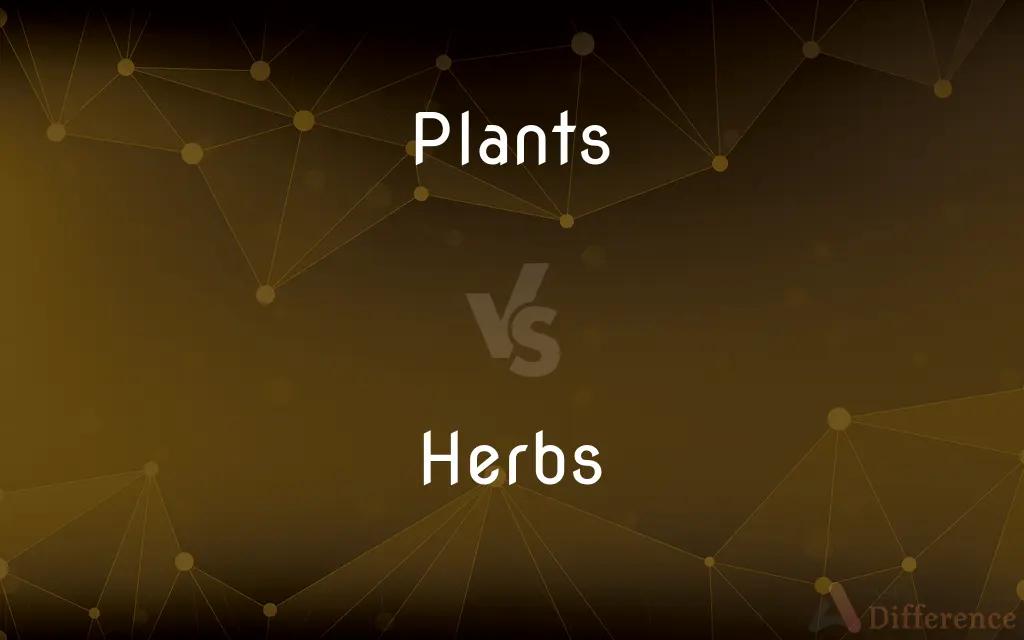Plants vs. Herbs — What's the Difference?
By Tayyaba Rehman — Published on October 15, 2023
Plants are all living organisms in the Plantae kingdom, while herbs are a category of plants with savory or aromatic properties used for flavoring, food, medicine, or fragrances.

Difference Between Plants and Herbs
Table of Contents
ADVERTISEMENT
Key Differences
Plants encompass a wide kingdom of living organisms that include trees, shrubs, grasses, herbs, bushes, and vines. On the other hand, herbs refer specifically to plants that are valued for their aromatic, culinary, medicinal, or in some cases, spiritual properties. While all herbs are plants, not all plants are considered herbs in the culinary and medicinal sense, showcasing a broad-versus-niche relationship between the two terms.
Plants possess a vast range of forms and structures, such as tall trees, sprawling vines, or bushy shrubs, demonstrating significant diversity in the Plantae kingdom. Conversely, herbs often portray a more modest physical structure, usually not developing woody stems, and are often characterized by their green and tender stalks. Therefore, herbs could be perceived as a subset of plants, with particular characteristics and uses that differentiate them from other members of the plant kingdom.
Plants form the base of the food chain and are crucial in maintaining the balance of the earth's ecosystem. Herbs, while a category of plants, have garnered a specialized role in human culture and society, particularly in the realms of cooking, medicine, and even ritual. The utility of herbs often springs from their aromatic leaves or seeds, which can be used to impart flavor to foods, create medicinal products, or produce scents in various forms.
Plants, being an extensive kingdom, possess varied means of reproduction, such as seeds, spores, and cuttings, and can be found all over the world, from the frigid poles to the hot equator. Herbs, in contrast, are usually cultivated or found in specific regions where their preferred growth conditions, such as sunlight, soil, and climate, are met, signifying their more specialized and selective nature in terms of cultivation and proliferation.
Plants play a pivotal role in the planet's health by providing oxygen, sustaining food webs, and creating habitats for numerous organisms. In contrast, herbs, while providing similar ecological benefits on a smaller scale, notably contribute to human practices in cooking, alternative medicine, and other domains, marking them as especially significant in the intersection of human culture and botany.
ADVERTISEMENT
Comparison Chart
Letters
6
5
Vowels
1
1
Consonants
5
4
Pronunciation
Plænts
Hɜːrbz
Word Type
Noun (plural)
Noun (can be used singularly or plurally)
Compare with Definitions
Plants
Factories or facilities where something is manufactured.
The city has several auto manufacturing plants.
Herbs
Plants with savory or aromatic properties used in cooking.
She added fresh herbs to the salad.
Plants
To place or fix in a particular spot.
The detective plants evidence at the crime scene.
Herbs
Plants used in medicine, religion, and cosmetics.
Some people use herbs for healing purposes.
Plants
Organisms belonging to the kingdom Plantae.
The garden has a variety of plants.
Herbs
A person’s natural ability or talent.
The young athlete showed great herbs in soccer. (Note: This usage is archaic and very rarely used in modern English.)
Plants
To establish or set firmly.
The university plants the seeds of knowledge in students.
Herbs
Leafy green plant parts used for culinary flavor.
Basil and oregano are popular herbs in Italian cuisine.
Plants
Any of various photosynthetic, eukaryotic, multicellular organisms of the kingdom Plantae characteristically containing chloroplasts, having cell walls made of cellulose, producing embryos, and lacking the power of locomotion. Plants include trees, bushes, herbs, ferns, mosses, and certain green algae.
Herbs
Plants used to flavor or garnish food.
Fresh herbs can elevate the taste of a simple dish.
Plants
A plant having no permanent woody stem; an herb.
Herbs
A plant whose stem does not produce woody, persistent tissue and generally dies back at the end of each growing season.
Plants
Any of various fungi, algae, or protists that resemble plants and were formerly classified in the plant kingdom. Not in scientific use.
Herbs
Any of various often aromatic plants used especially in medicine or as seasoning.
Plants
A building or group of buildings for the manufacture of a product; a factory
Works in an auto plant.
Herbs
(Slang) Marijuana.
Plants
The buildings, fixtures, and equipment, including machinery, tools, and instruments, necessary for an industrial operation or an institution
The university's mechanical plant.
Herbs
Plural of herb
Plants
A person placed in a group of spectators to influence behavior.
Plants
A person stationed in a given location as a spy or observer.
Plants
A misleading piece of evidence placed so as to be discovered.
Plants
A remark or action in a play or narrative that becomes important later.
Plants
(Slang) A scheming trick; a swindle.
Plants
To place or set (seeds, for example) in the ground to grow.
Plants
To place seeds or young plants in (land); sow
Plant a field in corn.
Plants
To place (spawn or young fish) in water or an underwater bed for cultivation
Plant oysters.
Plants
To stock with spawn or fish.
Plants
To introduce (an animal) into an area.
Plants
To place or fix in a certain position
Planted both feet on the ground.
Planted a kiss on my cheek.
Plants
To deliver (a punch or blow).
Plants
To fix firmly in the mind; implant
"The right of revolution is planted in the heart of man" (Clarence Darrow).
Plants
To establish; found
Plant a colony.
Plants
To station (a person) for the purpose of functioning in secret, as by observing, spying, or influencing behavior
Detectives were planted all over the store.
Plants
To place secretly or deceptively so as to be discovered or made public
Planted a gun on the corpse to make the death look like suicide.
Plants
To conceal; hide
Planted the stolen goods in the warehouse.
Plants
Plural of plant
Plants
To place something firmly in the ground.
She plans to plant tulips in the spring.
Common Curiosities
Do all plants produce flowers?
No, not all plants produce flowers; some reproduce via spores or cones.
What is the kingdom of plants?
Plants belong to the Plantae kingdom.
Are herbs always safe to consume?
While many herbs are safe, some can have side effects or be toxic in large amounts.
Can plants survive without sunlight?
Most plants need sunlight for photosynthesis, but some can survive in low light.
What are herbs typically used for?
Herbs are typically used for flavoring food, medicine, and fragrances.
Are all plants edible?
No, not all plants are edible; some can be toxic.
Can herbs grow indoors?
Yes, many herbs can be grown indoors with adequate light and care.
What is the largest group of plants?
The largest group of plants is angiosperms, or flowering plants.
Do plants need soil to grow?
While most plants grow in soil, some plants, like air plants, do not need soil.
How do herbs impact cuisine?
Herbs significantly impact cuisine by adding flavors, aromas, and nutritional value.
Can herbs be used as medicine?
Yes, many herbs are used in traditional and alternative medicine.
How do plants reproduce?
Plants can reproduce sexually via seeds and asexually via cuttings or division.
Are all herbs flowering plants?
Most herbs are flowering plants, but not necessarily all.
Are all plants beneficial to humans?
While many plants are beneficial, some can be harmful or toxic to humans.
Are herbs perennial plants?
Herbs can be annuals, biennials, or perennials, depending on the species.
Share Your Discovery

Previous Comparison
Online UPS vs. Offline UPS
Next Comparison
Commercial Bank vs. Non-Commercial BankAuthor Spotlight
Written by
Tayyaba RehmanTayyaba Rehman is a distinguished writer, currently serving as a primary contributor to askdifference.com. As a researcher in semantics and etymology, Tayyaba's passion for the complexity of languages and their distinctions has found a perfect home on the platform. Tayyaba delves into the intricacies of language, distinguishing between commonly confused words and phrases, thereby providing clarity for readers worldwide.














































